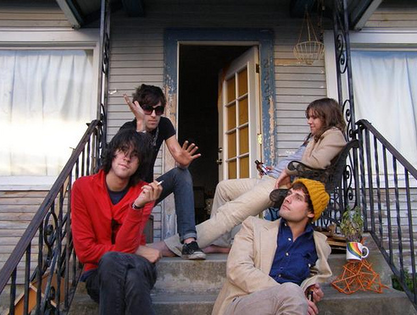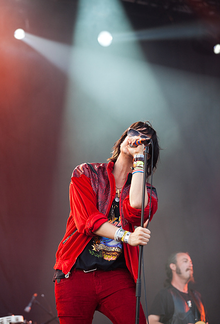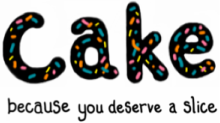 Irony isn't even ironic anymore.
Irony isn't even ironic anymore. If you read the title of this blog post and were all like, "OMG, wtf is this dude talking a/b?! Much confuse, so wow," chances are that you're not a millennial. In fact, you probably don't understand anything I've written thus far. It's OK. Lemme explain.
The truth is that millennials have been afforded unprecedented access to self-branding. Whereas teenagers and young adults in the 60s, 70s or 80s had to be content with cruising the streets of Small Town, America blaring their rock 'n' roll music, millennials have been able to globalize their petty adolescence. This amplifies normal teenage rebellion into a global movement. You no longer have to physically travel to New York to feel like part of the scene, you can experience it online with spotify, deviantART, google maps or whatever is in vogue. If you think you have to be present at the scene to be part of it, you're kidding yourself. The best example of this is the death of major music record labels and the rise of independent artists, labels and even no-label artists. Now that indie rock has become more mainstream, you'll notice that the new fad is small startups (particularly those focused on media and social engagement) and if you're in charge of managing user engagement via new media you're caught in a game of Whack-a-Mole that you can't keep up with.
From Elvis through Nirvana, bands have historically relied upon corporate record labels to Get Known. The ability of individuals to leverage opportunities and bandwidth prior to the internet was extremely limited. Bandwidth wasn't even a word. With the ability to carve out your own user base through targeted advertising and networking, those cool kids or high school rejects can find others. That's how OK Go got tens of millions of YouTube hits. Becoming a hit, or "going viral" as the cool kids say these days, isn't about creating content. It's about BEING content.
In order to leverage millennials and our lack of understanding budget constraints you need to realize that the internet is our Small Town, America and there is no main drag to drive down. While designers and theorists might argue that the internet is elegantly and intricately designed, the truth is that it's the approximate equivalent of hiring Jackson Pollock to design a city's civil engineering. It's going to be beautiful and it's going to be a disaster in terms of classical notions of order.
The truth is that millennials have been afforded unprecedented access to self-branding. Whereas teenagers and young adults in the 60s, 70s or 80s had to be content with cruising the streets of Small Town, America blaring their rock 'n' roll music, millennials have been able to globalize their petty adolescence. This amplifies normal teenage rebellion into a global movement. You no longer have to physically travel to New York to feel like part of the scene, you can experience it online with spotify, deviantART, google maps or whatever is in vogue. If you think you have to be present at the scene to be part of it, you're kidding yourself. The best example of this is the death of major music record labels and the rise of independent artists, labels and even no-label artists. Now that indie rock has become more mainstream, you'll notice that the new fad is small startups (particularly those focused on media and social engagement) and if you're in charge of managing user engagement via new media you're caught in a game of Whack-a-Mole that you can't keep up with.
From Elvis through Nirvana, bands have historically relied upon corporate record labels to Get Known. The ability of individuals to leverage opportunities and bandwidth prior to the internet was extremely limited. Bandwidth wasn't even a word. With the ability to carve out your own user base through targeted advertising and networking, those cool kids or high school rejects can find others. That's how OK Go got tens of millions of YouTube hits. Becoming a hit, or "going viral" as the cool kids say these days, isn't about creating content. It's about BEING content.
In order to leverage millennials and our lack of understanding budget constraints you need to realize that the internet is our Small Town, America and there is no main drag to drive down. While designers and theorists might argue that the internet is elegantly and intricately designed, the truth is that it's the approximate equivalent of hiring Jackson Pollock to design a city's civil engineering. It's going to be beautiful and it's going to be a disaster in terms of classical notions of order.
 Cleaning up after yourself? Ain't no millennial got time for that.
Cleaning up after yourself? Ain't no millennial got time for that. You'll also notice that a ton of people will be out there giving you advice that is obvious, then they'll be pretending like it's original and cutting-edge. Hint: it isn't.
Most of the advice people will give you is the same that you'll see on any customer population:
Focus on the user experience.
Make the site functionality intuitive.
Make sure you understand your customer.
Identify your market and cater to it.
These are all viable strategies when performed astutely, but the bottom line is that the best brands create markets (ohi, there's this new thing called Apple, amirite?). I would argue that the most important thing you can do is to create a brand with a solid, scalable vision. Focusing on 1-2 attributes that are distinct but malleable is key and making sure you deliver those attributes in every aspect of your business paves the road to your success.
For instance, check out Cake's branding and identity pillars:
Death by cute (pink and black are our colors, in case you haven't noticed!)
Have fun but be firm
Engage users with honesty and ecstasy
Focus on each individual's dreams
We live our brand according to "because you deserve a slice." We have a single-minded obsession with identity that provides you with the secret tips and advice you need to make over $1,000,000 in just 12 months.
If you didn't click that last hyperlink you really won't understand what I'm talking about. If you did, then you'll better understand branding and what it means to create a fun business that millennials enjoy participating in and contributing to.
Most of the advice people will give you is the same that you'll see on any customer population:
Focus on the user experience.
Make the site functionality intuitive.
Make sure you understand your customer.
Identify your market and cater to it.
These are all viable strategies when performed astutely, but the bottom line is that the best brands create markets (ohi, there's this new thing called Apple, amirite?). I would argue that the most important thing you can do is to create a brand with a solid, scalable vision. Focusing on 1-2 attributes that are distinct but malleable is key and making sure you deliver those attributes in every aspect of your business paves the road to your success.
For instance, check out Cake's branding and identity pillars:
Death by cute (pink and black are our colors, in case you haven't noticed!)
Have fun but be firm
Engage users with honesty and ecstasy
Focus on each individual's dreams
We live our brand according to "because you deserve a slice." We have a single-minded obsession with identity that provides you with the secret tips and advice you need to make over $1,000,000 in just 12 months.
If you didn't click that last hyperlink you really won't understand what I'm talking about. If you did, then you'll better understand branding and what it means to create a fun business that millennials enjoy participating in and contributing to.
 If the last Casablancas you heard of was
If the last Casablancas you heard of was made in 1942, you might be an Old.
Millennials are originality vampires. We hunt down creative and interesting things and then suck the life out of them, turning them into zombies. Then we abandon them and Big Media bogarts what has already become obsolete, estranging the millenial market segment and making Olds have Emotions about becoming too old too fast. If you're relying on analysis of market trends and following industry "thought" leaders as they claim they know what'll be the new cool, you're already behind. You don't have a brand, you have a mirror. And it's broken and you have all sorts of bad luck heading your way.
If you're going after millennials, you need to make sure that you're leading the change and not riding its wave. Focus on being original and not giving a crap if you fail. Be punk rock. If you fail, you'll learn what it takes to create a brand and stick to it. Fashion is cyclical and you may yet see your brand's popularity come back in style. If you follow my advice, well, in the words of Pedro...
If you're going after millennials, you need to make sure that you're leading the change and not riding its wave. Focus on being original and not giving a crap if you fail. Be punk rock. If you fail, you'll learn what it takes to create a brand and stick to it. Fashion is cyclical and you may yet see your brand's popularity come back in style. If you follow my advice, well, in the words of Pedro...

 RSS Feed
RSS Feed
